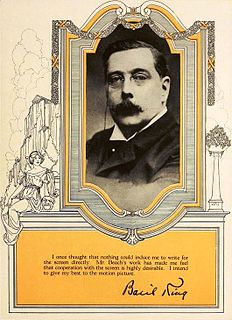A Quote by Charles Lamb
Ceremony is an invention to take off the uneasy feeling which we derive from knowing ourselves to be less the object of love and esteem with a fellow-creature than some other person is. It endeavours to make up, by superior attentions in little points, for that invidious preference which it is forced to deny in the greater.
Related Quotes
...those experiments be not only esteemed which have an immediate and present use, but those principally which are of most universal consequence for invention of other experiments, and those which give more light to the invention of causes; for the invention of the mariner's needle, which giveth the direction, is of no less benefit for navigation than the invention of the sails, which give the motion.
There are many points in the history of an invention which the inventor himself is apt to overlook as trifling, but in which posterity never fail to take a deep interest. The progress of the human mind is never traced with such a lively interest as through the steps by which it perfects a great invention; and there is certainly no invention respecting which this minute information will be more eagerly sought after, than in the case of the steam-engine.
For the superior morality, of which we hear so much, we too would desire to be thankful: at the same time, it were but blindness to deny that this superior morality is properly rather an inferior criminality, produced not by greater love of Virtue, but by greater perfection of Police; and of that far subtler and stronger Police, called Public Opinion.
If we are made in some degree for others, yet in a greater are we made for ourselves. It were contrary to feeling and indeed ridiculous to suppose that a man had less rights in himself than one of his neighbors, or indeed all of them put together. This would be slavery, and not that liberty which the bill of rights has made inviolable, and for the preservation of which our government has been charged.
We are repeatedly left, in other words, with no further focus than ourselves, a source from which self-pity naturally flows. Each time this happens I am struck again by the permanent impassibility of the divide. Some people who have lost a husband or a wife report feeling that person's presence, receiving that person's advice. Some report actual sightings, what Freud described in "Mourning and Melancholia" as "a clinging to the object through the medium of a hallucinatory wishful psychosis." Others describe not a visible apparition but just a "very strongly felt presence."
Friendship is far more delicate than love. Quarrels and fretful complaints are attractive in the last, offensive in the first. And the very things which heap fewel on the fire of ardent passion, choke and extinguish sober and true regard. On the other hand, time, which is sure to destroy that love of which half certainly depends on desire, is as sure to increase a friendship founded on talents, warm with esteem, and ambitious of success for the object of it.
When we are in love, our love is too big a thing for us to be able altogether to contain it within ourselves. It radiates towards the loved one, finds there a surface which arrests it, forcing it to return to its starting-point, and it is this repercussion of our own feeling which we call the other's feelings and which charms us more then than on its outward journey because we do not recognise it as having originated in ourselves.
My mother gave me a piece of bread, which was love and encouragement. The correction was the meat, the substance. And then she would sandwich that, sandwich that with another piece of bread, which was love and encouragement. That was very important in shaping and molding our morality, our understanding of ourselves, making sure that we didn’t think we were better than or less than anyone, feeling no more worthy or no less worthy than anyone else.
Love is about feeling that there is something bigger than just ourselves and our own worries and existence. Whether it is love of another person, of country, of God, of an idea, love is fundamentally an intense devotion to this notion that something is bigger than us. Love is ultimately larger than friendship, comfort, ceremony, knowledge, or joy. Indeed, as the Four Wise Ones once said, it may be all you need.
Let every creature have your love. Love, with its fruits of meekness, patience, and humility, is all that we can wish for ourselves and our fellow creatures. For this is to live in God, united with him, both for time and eternity. To desire to communicate good to everyone, in the degree that we can and to which each person is capable of receiving from us, is a divine temper, for thus God stands unchangeably disposed towards the whole creation.




































